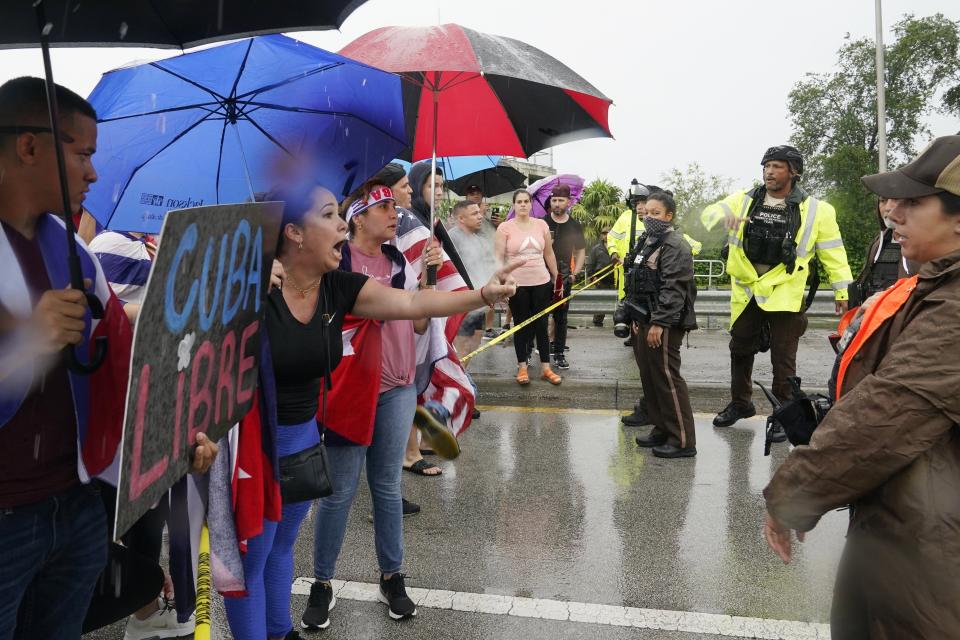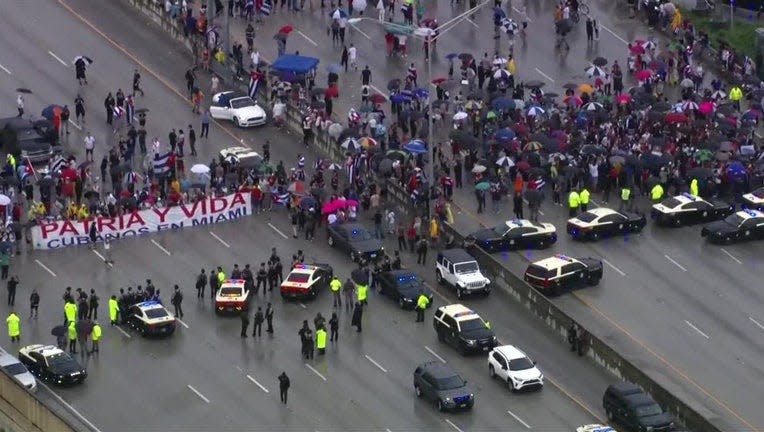Florida Gov. DeSantis' protest law was meant to prevent riots in the wake of BLM protests. Now it's in the way of SOS Cuba demonstrations.
- Oops!Something went wrong.Please try again later.
- Oops!Something went wrong.Please try again later.
TALLAHASSEE, Fla. – Crowds in Florida cities rallying and blocking roadways in support of anti-government protests in Cuba may be putting Gov. Ron DeSantis at odds with a tough new law he championed following last year’s Black Lives Matter demonstrations.
Large crowds closed Miami’s Palmetto Expressway and hundreds demonstrating blocked major streets this week in Orlando, Tampa and across Southwest Florida, leading to a handful of arrests, at least two for battery on law enforcement officers.
DeSantis said he supports the Florida protesters urging an end to the dictatorship in Cuba. And he insists these demonstrations are distinct from those that followed the death of George Floyd at the hands of Minneapolis police.
Cuba protests: 'Revolution is coming': Cuba protests cheered by Florida exiles
More like this: People across Florida are marching and holding protests in solidarity with Cuba

“The people understand the difference between peaceably assembling, which is obviously, people’s constitutional right, and attacking other people or burning down buildings or dragging people out of a car,” DeSantis said during a Tuesday roundtable with Cuban American leaders in Miami.
“They’re much different situations,” he said.
But several Florida Black lawmakers said the governor’s contrasting response to the demonstrations was hypocritical. Florida’s Cuban American community has been a potent force for Republicans, while Black Floridians overwhelmingly vote Democratic.
“Last year when there were Black Lives Matter protesters and the protests were largely peaceful in Florida, and he’s governor of Florida, the thought was there needed to be this law to keep protesters in line,” said state Rep. Fentrice Driskell, D-Tampa.
“It’s clearly hypocritical because the First Amendment gives us the right to free speech and assembly. It’s content-neutral, it doesn’t matter what it is you’re protesting,” Driskell said. “To pretend that what’s happening now is different than Black Lives Matter protests is a fiction.”
DeSantis' proposal sparked more protests: Sarasota protesters marched in streets for George Floyd; proposed law would make that a felony
More background: Florida Gov. Ron DeSantis announces tough measures for rioters and looters
Driskell and others said they were not advocating for use of the new law against the current demonstrators but instead argued that the governor’s response further clouded a standard already being challenged as unconstitutional in federal court by civil rights organizations.
Micah Kubic, executive director of the American Civil Liberties Union of Florida, one of the groups suing over the law, said "Floridians' right to protest should not be subject to Gov. DeSantis' wavering politics."

Supporters call law "anti-riot"
Florida’s new law, HB 1, was dubbed the “anti-riot law” by supporters. It creates new crimes stemming from protests that law enforcement considers are aimed at “inciting a riot,” and intensifies criminal and civil penalties for various activities.
The measure, officially titled the “Combating Public Disorder Act,” specifically makes it unlawful to “obstruct the free, convenient and normal use of any public street, highway or road,” making violators subject to $15 traffic citations. There are also penalties for mob intimidation and for unlawful assembly, involving three or more people involved in violent and disorderly conduct.
In Tampa, where crowds gathered Tuesday afternoon at Al Lopez Park and by evening blocked parts of Dale Mabry Highway and Columbus Avenue, three people were arrested by Tampa Police, including two men charged with battery on a law enforcement officer.
The protesters eventually closed off a ramp from Interstate 275 at Mabry Highway by gathering in an intersection, while others blocked the northbound lane of Mabry by kneeling on a Cuban flag. A Florida Highway Patrol trooper suffered a broken ankle along with lacerations to his arms and face while assisting Tamp officers during an arrest, said Florida Highway Patrol Sgt. Steve Gaskins.
Later in the evening, northbound Interstate 75 in North Fort Myers at Bayshore Road also was closed after demonstrators gathered in the middle lanes. Protests in the region also took place in Cape Coral, Fort Myers and Clewiston.
Miami’s Palmetto Expressway, which runs through Cuban American communities in western Miami-Dade County also was closed amid demonstrations.

New law avoided
Law enforcement officials seemed eager to avoid directly addressing Florida’s tough new protest law.
“The Florida Highway Patrol supports peaceful demonstrations; however, when protesters block limited access highways, they are not only breaking the law but endangering the lives of demonstrators and the public at large,” said Florida Highway Patrol Director Col. Gene Spaulding.
State Rep. Bobby Dubose of Fort Lauderdale, the Florida House Democratic co-leader, said he supports those protesting, but that the governor’s approach “just amplifies why this (anti-protest) law is unnecessary and what was driving it.”
“The governor made a lot of noise about people using a tool that’s been there in our history when there’s injustice,” Dubose said. “The governor sees it through two different lenses. There’s two Americas when he sees these people that look like me demonstrate, he calls for this unnecessary law.”
Rolando Chang Barrero, with the Palm Beach County Democratic Hispanic Caucus, said blocking roads and highways is dangerous, and shouldn’t happen.
But, he added, “This is a passionate moment. I feel it myself, but we need to be very respectful and considerate” to the public at large.
Chang Barrero said it took his 84-year-old father four hours to drive home Tuesday because of traffic snarls resulting from the demonstrations in Miami-Dade. Instead of blocking roads, he said he’s joining a nonpartisan roundtable discussion Thursday to bring other options to the table – and to consider a potential march later in Washington, D.C.
“This is a Category 5 emergency in Cuba, and we all need to come together and help each other,” he said.
John Kennedy is a reporter in the USA TODAY Network’s Florida Capital Bureau. He can be reached at jkennedy2@gannett.com, or on Twitter at @JKennedyReport
This article originally appeared on Sarasota Herald-Tribune: SOS Cuba, Black Lives Matter 'different situations,' DeSantis says

